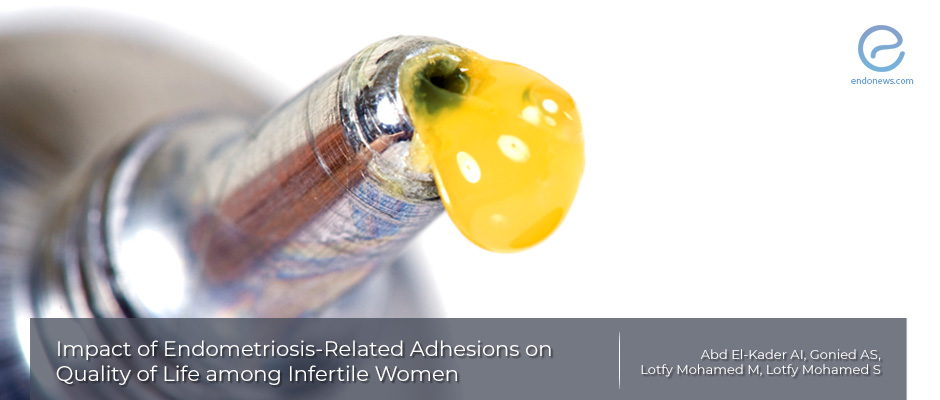Impact of Endometriosis-Related Adhesions on Quality of Life among Infertile Women
Apr 4, 2019
Does Endometriosis-Related Adhesion matter?
Key Points
Highlight:
- Quality of life was significantly impacted by endometriosis-related adhesions.
Background:
- Endometriosis is considered the most common cause of pelvic adhesions in women.
- Adhesions are bands of connective tissue, which connect two different tissues that are normally separated.
- Adhesions may form as a result of endometrial implants bleeding into the surrounding area and causing an inflammatory reaction.
- There are many complications associated with endometriosis-related adhesions such as dyspareunia, and rectal constriction, infertility, chronic pelvic pain, and bowel obstruction.
- Here, Dr. Mohamed group from Egypt investigated the impact of endometriosis-related adhesions on quality of life among infertile women.
Key points:
- In this study, 109 cases with endometriosis were enrolled, and 41 participants (37.6%) were found to have adhesions with endometriosis.
- Demographic characteristics of the women with endometriosis-related adhesions were not significantly different from those of women without endometriosis-related adhesions.
- The most common location for endometriotic adhesions was adnexal adhesion (51.2%) followed by adhesion of anterior abdominal wall (24.4%).
- Quality of life was significantly impacted by endometriosis-related adhesions (P=0.002).
Conclusions and limitations:
- Adhesions caused by endometriosis had a negative impact on quality of life of the women.
- Further researches might be conducted to study the same problems in larger populations of the women with long-term follow-up.
Lay Summary
Endometriosis is considered the most common cause of pelvic adhesions in women. It is considered one of the main underlying causes of the development of adhesions.
Adhesions are bands of connective tissue, which connect two different tissues that are normally separated thus, interfering with the function of the organs that are affected. Adhesions may form as a result of endometrial implants bleeding into the surrounding area and causing an inflammatory reaction. There are many complications associated with endometriosis-related adhesions such as dyspareunia, and rectal constriction, infertility, chronic pelvic pain, and bowel obstruction.
Here, Dr. Mohamed group from Egypt investigated the impact of endometriosis-related adhesions on quality of life among infertile women.
109 women with endometriosis were enrolled in this study, and 41 participants (37.6%) were found to have adhesions with endometriosis. Demographic characteristics of the women with endometriosis-related adhesions, such as age and body mass index, were not significantly different from those of women without endometriosis-related adhesions. The most common location for endometriotic adhesions was adnexal adhesion (51.2%) followed by adhesion of anterior abdominal wall (24.4%). Quality of life was significantly impacted by endometriosis-related adhesion. It was noticed that all the cases with a severe degree of adhesions presented with the poor quality of life.
In conclusion, Dr. Mohamed group have shown that adhesions caused by endometriosis had a negative impact on quality of life of the women. Further researches might be conducted to study the same problems in larger populations of the women with long-term follow-up.
Research Source: https://www.ncbi.nlm.nih.gov/pubmed/30644248
Adhesions Endometriosis Impact Infertility Quality of Life

